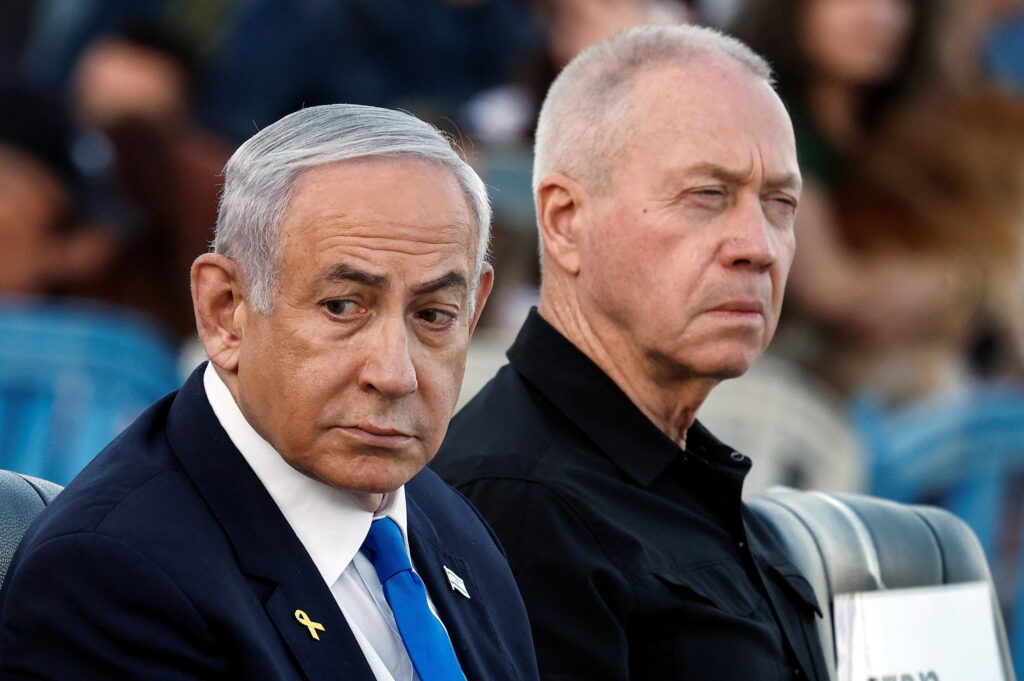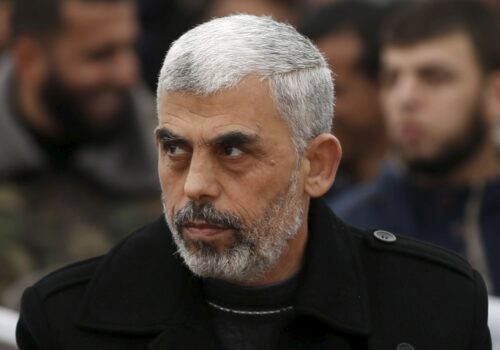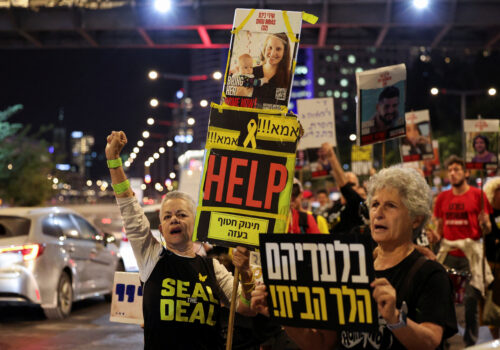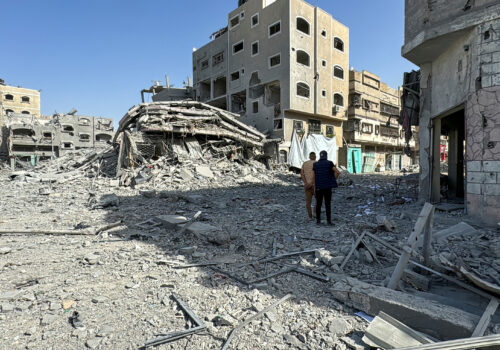Six months after International Criminal Court (ICC) Prosecutor Karim Khan filed applications for arrest warrants against three Hamas and two Israeli officials, the ICC’s Pre-Trial Chamber I finally responded, issuing arrest warrants on November 21 for all of the officials who are alive or at least not confirmed to be dead. The arrest warrants are significant. They reflect a unanimous determination by a three-judge panel, operating under a commitment to act impartially and conscientiously, that there are reasonable grounds to believe that Israeli Prime Minister Benjamin Netanyahu and former Israeli Minister of Defense Yoav Gallant are responsible for war crimes and crimes against humanity committed after October 7, 2023 in Gaza.
What do the arrest warrants mean for Netanyahu, Gallant, and Israel?
The arrest warrants will have practical, tangible impacts on Netanyahu and Gallant. All ICC member states have an obligation to arrest those subject to warrants if the suspect is present on their soil. While a handful ICC member states have expressed opposition to the issuance of the arrest warrants, only one member state has explicitly said it would not comply with its legal obligations to arrest suspects, which could result in a judicial finding of noncooperation and referral to the Court’s Assembly of States Parties for further action. Moreover, a larger number of ICC member states—including allies of Israel—have indicated support for the ICC, with some saying they would respect their binding obligations as member states and carry out the arrest warrants. These responses suggest that Netanyahu and Gallant will likely avoid travel to most of the 124 ICC member states for fear of arrest. While Netanyahu has not traveled outside of Israel for more than a year, any post-conflict travel has likely been dramatically restricted.
The issuance of arrest warrants also provides further indications that Israeli officials must change their conduct of the war or else risk additional charges for war crimes, crimes against humanity, and potentially genocide. The arrest warrants are not, as Israeli Foreign Minister Gideon Sa’ar said, “an assault on Israel’s right to defend itself.” Nor are they a limitation on Israel’s “right to defend its people” following the October 7 attacks, as Israeli President Isaac Herzog said. Instead, they signify the fact that any war, offensive or defensive, must be waged within the confines of international humanitarian law—a body of law developed by states and militaries and adopted by Israel, intended to limit the impact of war on civilian populations and wounded soldiers.
What about some claims circulating online that the arrest warrants create a “false equivalence,” given the ICC’s issuance of an arrest warrant for the Hamas military leader Mohamad Deif, who Israel says it killed in July but whose death the ICC prosecutor’s office could not verify? Under ICC procedures, judges do not compare the suspects to each other in deciding whether to issue warrants or subsequently convict defendants. Instead, judges must compare the conduct and intent of the suspect to the law and issue arrest warrants where there are “reasonable grounds to believe” that their conduct and intent meet the elements of war crimes and crimes against humanity. In issuing warrants, the Pre-Trial Chamber I reviewed what the prosecutor called “objective, verifiable evidence” after an independent investigation and found that there were reasonable grounds to believe Netanyahu, Gallant, and Deif have all committed war crimes and crimes against humanity, and thus that the case should proceed.
What are the next steps for the ICC?
The ICC prosecutor said that his office will continue to investigate “the situation in the State of Palestine with focus,” taking forward additional lines of inquiry while investigating “incriminating and exonerating circumstances equally.” The Office of the Prosecutor can continue to collect evidence of the crimes alleged in the arrest warrants, building its case for eventual trial. The Office of the Prosecutor may also apply for arrest warrants for additional charges against the suspects already named or against new suspects.
The first main procedural step following the issuance of arrest warrants would be a hearing on confirmation of charges by the Pre-Trial Chamber. Such a hearing typically happens after the suspect has been arrested or surrendered to the court. There are two limited circumstances that allow for an in absentia confirmation of charges: (1) if the suspect was previously accessible to the Court but has fled, or (2) if the suspect has never been accessible to the Court and cannot be found, meaning that all efforts to locate and arrest the individual have failed because their precise whereabouts are unknown. Neither seems to apply to Israel’s prime minister or former defense minister.
Only time will tell whether and when a hearing to confirm charges will proceed, either in person or in absentia, but any such hearing is likely years away. For reference, there have been no confirmation of charges hearings in the twenty months since the ICC issued arrest warrants for Russian President Vladimir Putin and Russian Commissioner for Children’s Rights Maria Lvova-Belova.
Only after a Pre-Trial Chamber confirms charges can a trial take place, requiring the presence of the accused.
While the Office of the Prosecutor continues its investigation and the suspects most likely remain at large, the ICC will also likely face legal challenges by Netanyahu, Gallant, and/or the State of Israel. Israel has already previewed two arguments in challenges it filed following the application for arrest warrants, both of which the Pre-Trial Chamber denied last week.
First, in September, Israel filed a request that the Pre-Trial Chamber require the Prosecutor to formally notify Israel, under Article 18(1) of the Rome Statute, of any investigation into events in and around Gaza from October 7, 2023 onward. The Pre-Trial Chamber denied this request. It found that the prosecution complied with statutory obligations in notifying Israel and other states in March 2021 that it was opening an investigation into Palestine, that this notice was sufficiently specific, that no new notice was required after October 7, and that Israel failed to respond within the statutory time limit to request a deferral of investigation. Israel may seek to appeal this decision.
On the same day, Israel filed a second challenge arguing that the ICC lacked jurisdiction to investigate Netanyahu and Gallant and requesting a suspension of proceedings until the Court has ruled whether it has jurisdiction. The Pre-Trial Chamber rejected this challenge because it was premature, as challenges regarding jurisdiction and admissibility should come only after the Court has issued arrest warrants. Now that arrest warrants have been issued, Israel is likely to again challenge the Court’s jurisdiction on the same grounds it has already raised—that Israel has not accepted the Court’s jurisdiction—which the Pre-Trial Chamber suggested it was not persuaded by and which a prior Chamber also rejected.
Israel is also likely to file a challenge based on admissibility, arguing that the Israeli courts have jurisdiction over any potential case against Netanyahu and Gallant. An admissibility challenge would only succeed upon a showing that Israeli courts are, in fact, investigating Netanyahu and Gallant for the list of war crimes and crimes against humanity charges before the Court.
Political battles ahead
While engaging in these investigative and procedural next steps, the Office of the Prosecutor and the ICC as a whole will have to confront what is likely to be increasing pressure from Israel and its allies. Israel has targeted the ICC with a coordinated campaign of intimidation and hacking for the past nine years because of its preliminary examination and investigation of what the ICC calls “the situation in Palestine.” Chances are that these tactics will increase following the arrest warrants.
The ICC will also likely face legal challenges imposed by the United States and perhaps other countries. In May, President Joe Biden called the application for arrest warrants “outrageous,” and last week used the same language to condemn their issuance. While Biden has not indicated support or opposition to sanctions against the ICC—imposed during the first Trump administration and revoked by Biden—members of Congress are pushing for such action, which President-elect Donald Trump is expected to support.
In June, after arrest warrant applications were filed, the US House of Representatives passed a bill to sanction individuals involved in ICC prosecutions of American citizens and citizens of allied nations that are not ICC member states, which includes Israel. While the Senate has not yet voted on this bill, senators have indicated their support for sanctions and suggested consequences for the arrest warrants and compliance with them, noting that the incoming Senate Republican majority will bring a bill to the floor next year.
The extent to which any sanctions impact the ICC’s operations will depend on their scope, but at least some interruptions or challenges would be expected. US opposition to ICC action against Israel also raises questions of double standards and bias given US support for the ICC’s investigation into and arrest warrants issued against Putin and other Russian officials—backed by those most vociferously opposed to action against Israel—which rely on the same jurisdictional basis that the Court is using to take action against Netanyahu and Gallant.
Elise Baker is a senior staff lawyer for the Strategic Litigation Project.
Further reading
Thu, Oct 17, 2024
Experts react: Yahya Sinwar is dead. Here’s what’s next for Hamas, Gaza, Israel, and the Middle East.
New Atlanticist By
Israel confirmed on Thursday that it had killed the Hamas leader. Atlantic Council experts share their insights on what this means for the immediate conflict and beyond.
Wed, Oct 30, 2024
Inside Israeli politics and public opinion with a pollster
MENASource By Stefanie Hausheer Ali
A Tel Aviv-based public opinion researcher and political advisor was interviewed to discuss how Israelis view Prime Minister Benjamin Netanyahu, the ongoing conflict, and the future.
Tue, Oct 29, 2024
Update: Israel claims it is no longer occupying the Gaza Strip. What does international law say?
MENASource By Celeste Kmiotek
On July 19, the International Court of Justice released an Advisory Opinion on the Legal Consequences Arising from the Policies and Practices of Israel in the Occupied Territory, Including East Jerusalem.
Image: Israeli Prime Minister Benjamin Netanyahu and Israeli Defense Minister Yoav Gallant attend a ceremony for the 70th cohort of military combat officers, at an army base near Mitzpe Ramon, Israel, October 31, 2024. REUTERS/Amir Cohen



